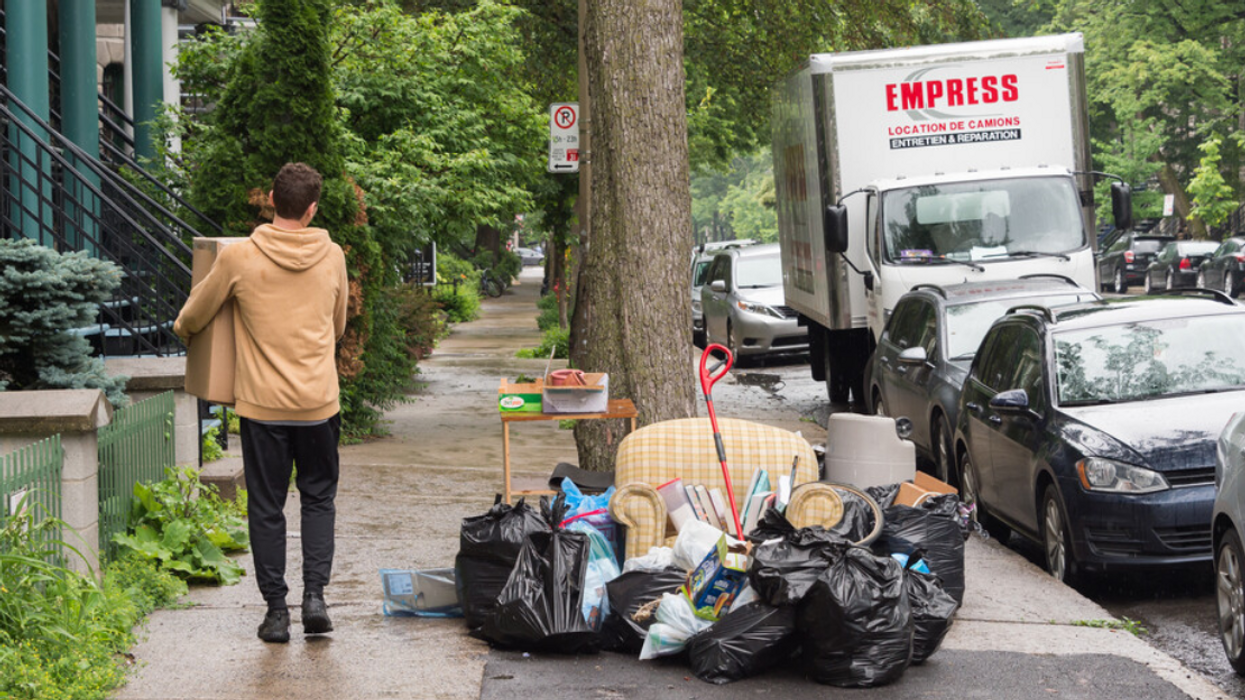6 Things Tenants Need To Know Before Renting A Montreal Apartment
We asked housing experts for their top tips!

Someone moves their belongings on July 1 in Montreal.
As average rent creeps up, finding quality, affordable Montreal apartments is becoming increasingly difficult, even for people who have lived here their whole lives. An abundance of suspicious listings and sketchy landlords poses an additional challenge.
For those from outside of Montreal, especially international students, it’s understandably common to be unaware of local housing rights and the regulations that protect them. This can lead to people falling for scams and making avoidable mistakes that can make or break their time in the city.
Thankfully, organizations like Concordia University’s Housing and Job Resource Centre (HOJO) are here to support renters, especially students, who make up a significant percentage of Montreal apartment tenants each year. MTL Blog asked HOJO experts about what issues renters often come across, and how to avoid getting caught in a sticky situation. These tips are good for everyone — we all deserve safe, affordable and scam-free housing!
Here are the do's and don'ts for renting in Montreal.
DO sign an official Quebec lease
It’s your right as a renter to have an official lease, especially because they detail Quebec housing regulations on the document itself. Your landlord should provide you with one, and you can verify the documents you receive against the templates available from the government.
DON'T send a landlord any money before signing your lease
It's common for landlords to ask unwitting tenants for additional money, sometimes even before a formal agreement has been signed. This is not how renting works, and you should always wait until your lease is signed before sending your rent — the only money your landlord is allowed to ask you for.
HOJO explained that often, international students with no credit history or references in Canada may feel pressure to agree to additional requests from landlords in their attempts to secure housing. Even if you’re a new arrival with no credit and no connections, you still have the same housing rights, no matter how insistent your landlord may be.
DO withhold unnecessary personal information
“International students might feel like they have to give a potential landlord any and all information they can ask for,” HOJO explained, “but this isn’t the case.” Landlords can’t ever ask you for your SIN, credit card number, driver’s license, passport number, student visa, health insurance number or bank account number.
DON'T pay your lease with Bitcoin, coupons or any other untraceable currency
These payment methods, although crypto may be trendy, make it dangerously easy for landlords to scam you out of your precious student income. It’s important to pay your rent through traceable methods, both for any future legal actions and to make sure your landlord can’t claim you never paid.
DO your own background checks on any suspicious landlords or property agents
“Suspicious” here means any landlord who claims to be outside the country. Per HOJO, this is a common tactic used in rental scams. “Scammers may even pretend to be an agent for a real estate company or a management company acting on behalf of a landlord who’s out of the country,” they told MTL Blog. To check if your potential landlord is legit, try searching Montreal’s municipal directory of property owners. You can also do a simple Google search to verify the management company isn’t six scammers in a trench coat.
DON'T pay your landlord any deposits or fees besides the first month's rent (or a portion of it)
Landlords in Quebec are not allowed to ask for any kind of fee or deposit from a renter or potential tenant. Common examples of illegal fees are application fees, damage deposits, key deposits or furniture deposits, according to HOJO. Your landlord can only ask you to pay a portion, or the total amount, of the first month’s rent in advance, nothing else.
There are plenty of resources out there to help new renters manage the chaotic housing market. If you find yourself in a sticky situation with your landlord, including discrimination, HOJO recommends you reach out to the Comité du Logement (local housing committee), who are there to help.
- Here's How Much Your Quebec Rent Could Go Up In 2023 ›
- The Montreal Housing Market Is Wild Right Now, But There's Some Hope For Wannabe Homeowners ›
- Montreal's Average Rent Is Already Increasing In 2023, But These Areas Are Staying Cheap ›
- Quebec Has A New Rent Registry To Hold Landlords Accountable & Help You Avoid Price Hikes - MTL Blog ›
- A Quebec Bill Would Make It Illegal For Landlords To Ban Pets - MTL Blog ›
- What's Open & Closed In Montreal On Canada Day 2023 - MTL Blog ›
- 3 Ways to Make Montreal Moving Day More Vacation Than Evacuation - MTL Blog ›
- Montreal Rent Hit New Heights, But Signs Point To A Possible Slowdown - MTL Blog ›
- 6 things I learned about Montreal rent that changed how I hunt for apartments - MTL Blog ›
- Montreal Rent Prices Are Up & Here’s How People Are Cutting Costs - MTL Blog ›
